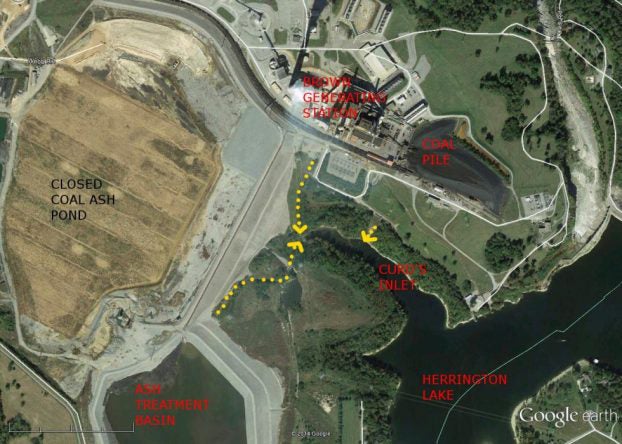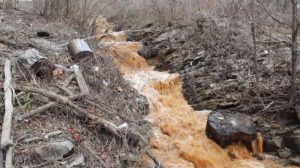September: Lawsuit over Herrington Lake pollution reinstated
Published 12:35 pm Monday, December 24, 2018

- File photo Kentucky Waterways Alliance An edited aerial photo shows the size of the closest coal ash pond behind E.W. Brown Generating Station on Herrington Lake in Mercer County.
Attorneys and area activists continued their fight to make Kentucky Utilities acknowledge and clean up pollutants allegedly seeping into the local drinking water supply in Herrington Lake.
The legal forces and local residents behind a move to hold Kentucky Utilities responsible for pollutants in Herrington Lake, especially near Dix Dam, had a case against the company reinstated on Sept. 24, 2018.
Earthjustice’s case will be “headed back to district court, where we’ll finally be able to reach the merits of the case,” said attorney Ben Locke.
In 2017, Earthjustice, along with the Kentucky Waterways Alliance and Sierra Club, filed a suit against KU, demanding it cleanup of pollution they argued comes from the E.W. Brown Power Plant. Coal ash waste containing selenium and other poisons has made its way into the lake through groundwater, they argued.

File Photo Kentucky Waterways Alliance
Discolored water was recorded during a visit near the E.W. Brown Generating Station in Mercer County.
Kentucky Division of Water testing results showed nine out of 10 fish near the plant with selenium levels 98 times the amount legally allowed.
The testing was done because four years ago, KU was being inspected following a state fine and had entered into an agreement to clean up some contamination. During the inspection, more evidence of pollution was found in the discoloration of lake water near the site.
Included in Earthjustice’s suit was an independent study, ultimately published in an international scientific journal, showing head and spine deformities in fish. A fishery biologist said the deformities are associated with selenium exposure.
KU dismissed the results as “political posturing” and said they were “inconsistent” with what other testing had found, and that it was already in agreement to follow a “corrective action plan” set up by the state.
In December 2017, U.S. District Judge Danny Reeves ruled his court has no authority over the case. The suit’s complaints were based on two federal acts, the Federal Clean Water Act and the Resource Conservation and Recovery Act.
The ruling dismissing the groups’ case stated that “Congress determined that regulation of groundwater should be left to the states.”
That ruling was appealed and Locke said, “What the appellate court said was that the residents of Herrington Lake have a right and a standing to file this lawsuit, and have a standing in the court to file against KU for the harm caused.” He said KU’s “so-called corrective action plan is no excuse for kicking the plaintiffs out of court.”
Locke said the group will have oral arguments in front of the 6th District Circuit Court judges. “We will have an opportunity to go back to court and go to discovery, gather facts from KU that will shed light on what’s going on at E.W. Brown Power Plant and in Herrington Lake. That means we’ll be highlighting the problems, such as the selenium and the fish deformities that have been observed.”






